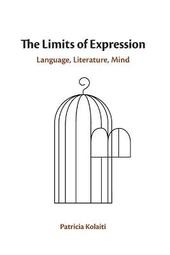
|
The Limits of Expression: Language, Literature, Mind
Paperback / softback
Main Details
| Title |
The Limits of Expression: Language, Literature, Mind
|
| Authors and Contributors |
By (author) Patricia Kolaiti
|
| Physical Properties |
| Format:Paperback / softback | | Pages:152 | | Dimensions(mm): Height 231,Width 152 |
|
| Category/Genre | Philosophy of language
Semantics
Philosophy of the mind |
|---|
| ISBN/Barcode |
9781108406291
|
| Classifications | Dewey:401 |
|---|
| Audience | | Professional & Vocational | |
|---|
| Illustrations |
Worked examples or Exercises; 3 Line drawings, black and white
|
|
Publishing Details |
| Publisher |
Cambridge University Press
|
| Imprint |
Cambridge University Press
|
| Publication Date |
28 October 2021 |
| Publication Country |
United Kingdom
|
Description
Taking as its starting point what is sometimes called 'the prison house of language' - the widespread feeling that language falls terribly short when it comes to articulating the rich and disparate contents of the human mental tapestry - this book sets out a radically new view of the interplay between language, literature and mind. Shifting the focus from the literary text itself to literature as a case of human agency, it reconsiders a wide range of interdisciplinary issues including the move from world to mind, the existence or otherwise of a property of literariness or essence of art, the nature of literature as a unique output of human cognition and the possible distinctiveness of the mind that creates it. In constant dialogue with philosophy, linguistics and the cognitive sciences, this book offers an invaluable new treatment of literature and literary language, and sketches novel directions for literary study in the twenty-first century.
Author Biography
Patricia Kolaiti is a Lecturer at New York College, Athens. From 2011-14, she was Associate Researcher with the Balzan project on 'Literature as an Object of Knowledge' based at St John's College Research Centre, Oxford. She is a published poet, and her collection Celesteia (2007) was nominated for the 2008 First Book Diavazo Award in Greece.
Reviews'Probably the best book on literature, language and mind I have ever read. It makes a case for genuinely reciprocal interdisciplinary practices and points the way to epistemologically more robust study in the arts and humanities. It will be hugely influential.' Tim Wharton, University of Brighton
|